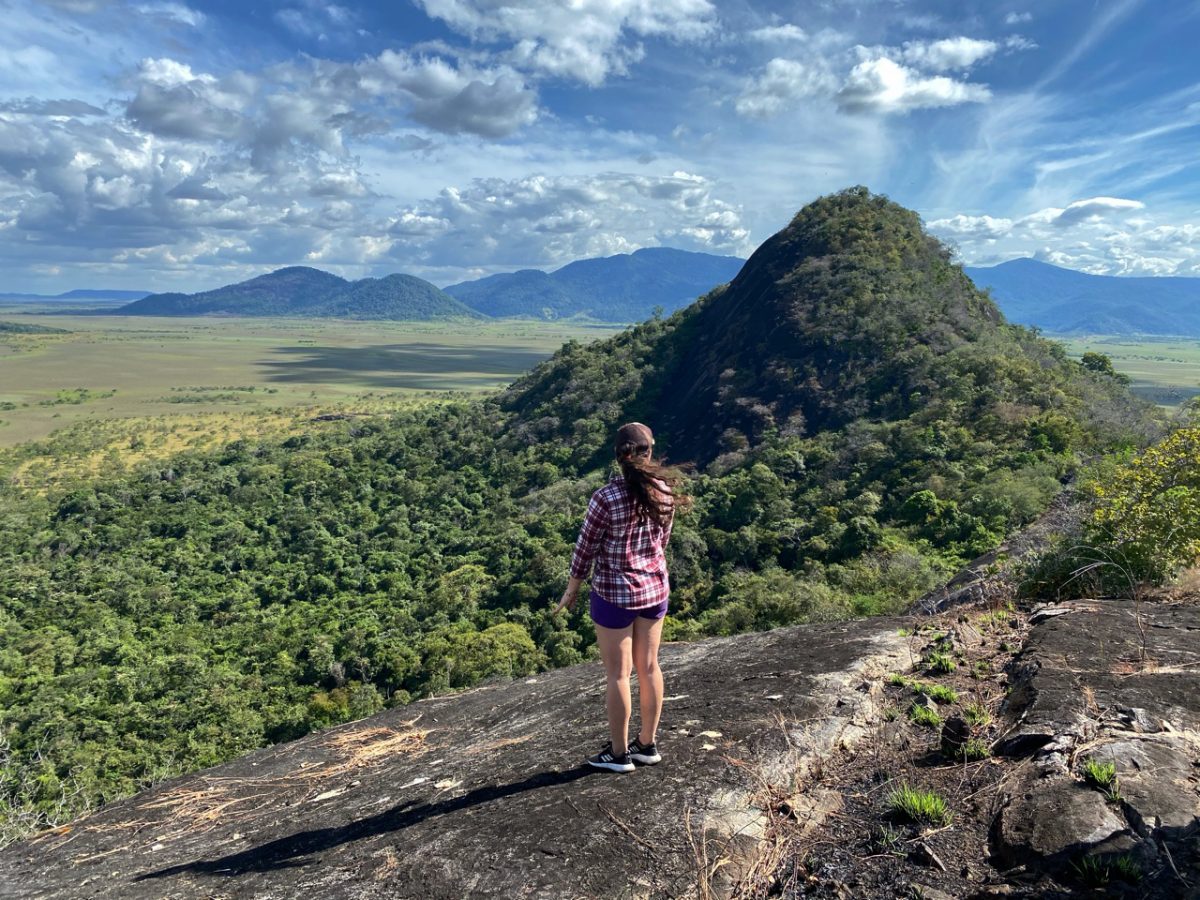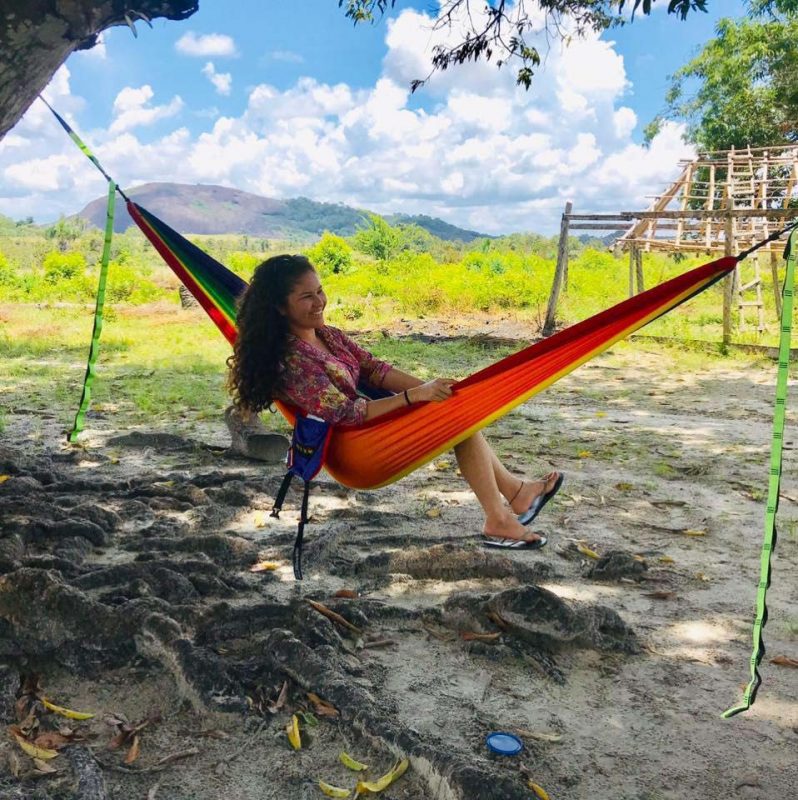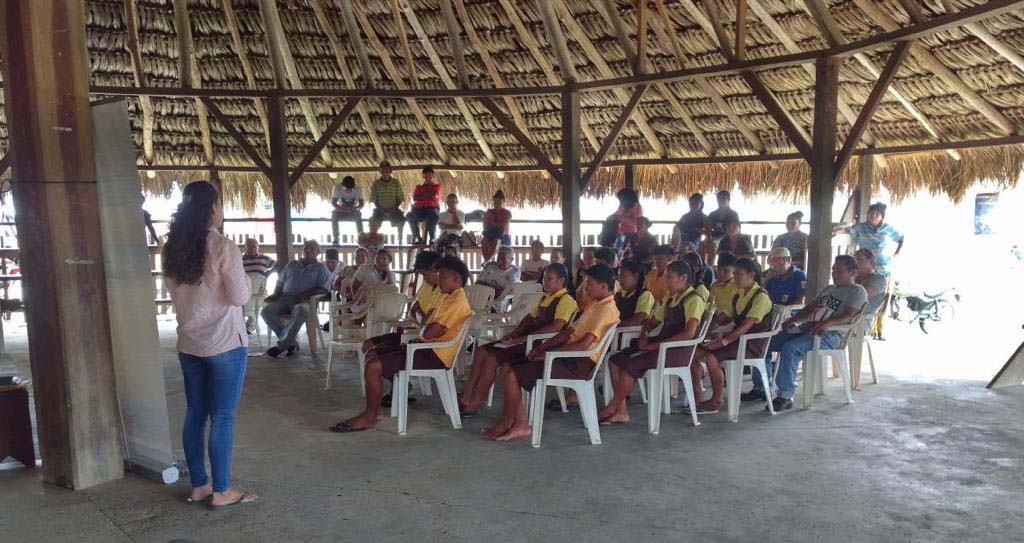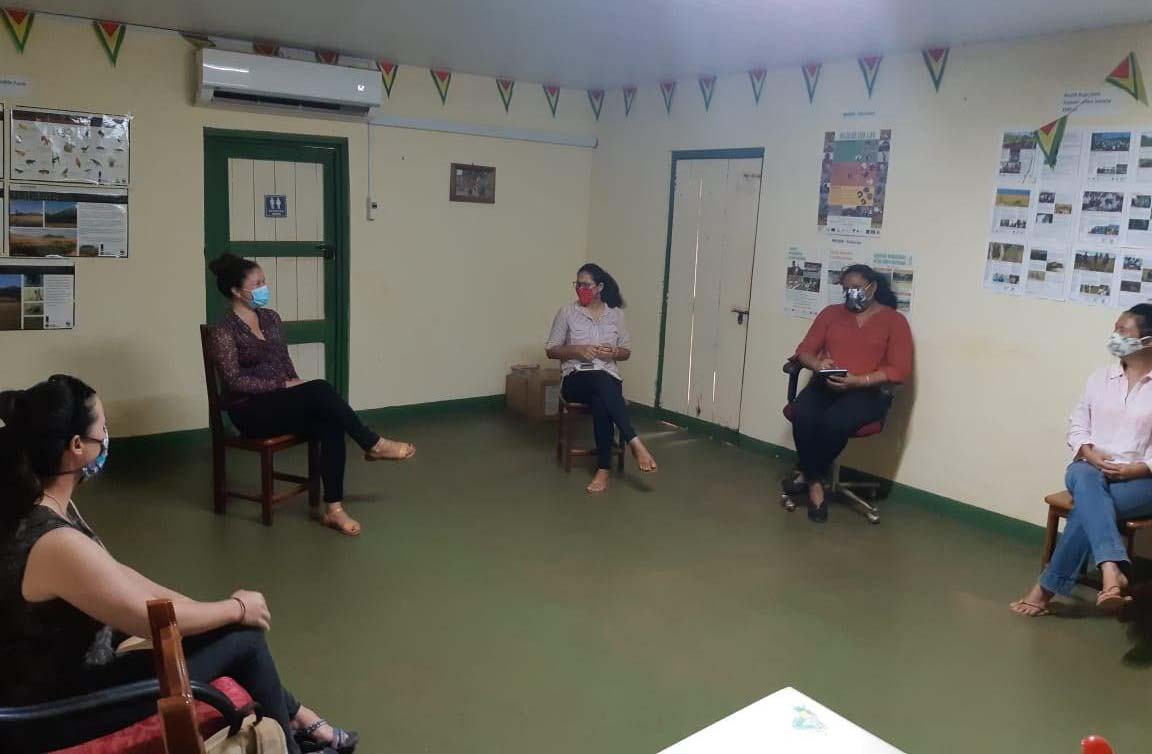It was a struggle for Michelle Kenyon to leave the only home she knew in the Rupununi to attend secondary school in Georgetown and she recalls how shocked she was at everything she saw. It was the first time she had travelled to the city and was in awe when she first set eyes on the seawall. Never having seen “so many people in one place, that was scary,” she said.
But even as she struggled with adapting to a new way of living, Kenyon said she knew that she wanted Region Nine to always be her home and this did not change even after she attended the University of Guyana years later. Today Kenyon, the holder of a law degree, believes that she is lucky to have landed a job that sees her being domiciled in Lethem and literally living her best life as she contributes to the sustainable development of the wildlife of the region.
Kenyon is the gender focal point consultant with the Sustainable Wildlife Management (SWM) Programme, which started in November 2018 and her work focuses on Free Prior and Informed Consent (FPIC), an important principle that works as a safeguard for Indigenous People and which can protect their right to participation. The FPIC process, according to Kenyon, ensures that whatever anyone wants to do with an indigenous community is understood by the residents and that at the end of it they give their consent.
“When the project came along I was looking for a job and I know this is my home and I know the place, I know the people so I think I had a little [advantage] of being able to get the position… and that’s how I got the job,” Kenyon told the Stabroek Weekend from her home in Lethem.
Kenyon’s role is going to the villages and explaining the SWM project. The SWM Programme, which is funded by the European Union is being executed in eight countries and in Guyana the Rupununi is the only region where it is being undertaken. She noted that Region Nine they depend a lot on wildlife and natural resources and the project envisions that while they continue to enjoy these resources residents must understand that their use affects the wildlife population and other natural resources.
“In order for us to continue living as we are living, depending on wildlife, we need to understand that we affect the population and we cannot keep going out and hunting and if we see five deer, we kill all five… deer. We have to think about tomorrow and about the future. We have to use it sustainably,” she explained.
According to its website, the SWM Programme is a major international initiative that aims to improve wildlife conservation and food security by developing innovative, collaborative and scalable new approaches to conserve wild animals and protect ecosystems, whilst at the same time improving the livelihoods of indigenous peoples and rural communities who depend on these resources.
In Guyana, it is encouraging coordinated community-driven initiatives that support food security and traditional livelihoods. These will contribute to maintaining healthy fish and terrestrial wildlife populations. The programme is being implemented by the Guyana Wildlife Conservation and Management Commission in coordination with the Center for International Forestry Research. The SWM Programme is working closely with indigenous hunters and local conservationists to maintain healthy fish and mammal populations. In the South Rupununi, wildlife use guidelines have been defined in seven pilot communities and wildlife use surveys have been carried out in 140 households.
‘My home’
Kenyon was born in the Rupununi and grew up between Lethem and the Saddle Mountain Ranch, located in South Rupununi.
“Rupununi is my home and I am never going to live anywhere else,” she declared.
Armed with a law degree, Kenyon said that she knew it would have been difficult to get employment in the Rupununi but she was determined not to see employment in the city. She recalled that before attending UG and even during semester breaks she worked with the International Organisation for Migration (IOM) on their health projects and she also worked with Remote Area Medical as a programme assistant and as such all of her work experience has been within Region Nine in communities.
“So when I finished UG and I came back I really did not want to go back to Georgetown and I think although the FPIC is more like a social safeguard. I really feel privileged to have a job in this area in the Rupununi, working towards the development of Region Nine in a way I would like it to go. I feel blessed to have such a job…,” she said.
While her work has been restricted somewhat with the advent of COVID-19 Kenyon said she continues to work over the telephone and via the Zoom platform. She explained that the SWM project works with the local district councils and non-government organisations (NGOs) through supporting them with technical and financial support to execute their mandates.
Chronicling her journey, Kenyon recalled that when she completed sixth form at Marian Academy, she returned home and she took some years off because she was not ready to return to Georgetown just yet. She noted that during her school days her only experience in Georgetown was “school home, school home” and every holiday she returned to Region Nine.
“So I didn’t really explore Georgetown and I was a young woman and the people I lived with were strict so I wasn’t allowed to go out…and do things teenagers do. So when I came home after sixth form it was like a nice break. I had freedom and I started to really enjoy it. Then I realised that I couldn’t just finish my education at A-Levels I had to do something more,” she recalled.
It was then the University of Guyana came into focus and she applied for three programmes, English, Social Work and Law and was accepted into all. In the end, at the age of 21, she chose law as she believed it was a good degree to have as a foundation if she wanted to branch off into anything else.
Back then as well, she said, she had a “romantic idea about law and justice” but she realised that in Guyana if one does not have money one can face so much injustice. But “if you have a lot of money you can get a good lawyer and you can get away with a lot of things. I did not want to be a part of that kind of work, to be honest,” she said. As a result, when she completed the degree she was not motivated to go to law school in Trinidad and Tobago.
The job she does now is about justice and ensuring that people’s rights are respected. “I think I am doing my part,” she added. She explained that one of the major focuses of SWM is achieving gender equality in all of its work and she is also responsible for ensuring that gender equality and women’s empowerment permeates everything she does.
Kenyon believes there is room for improvement in the area of health, education and the social safeguards across the region. She noted that while similar challenges exist elsewhere, Region Nine is the largest in terms of land, so communities are spread out. When someone is sick in those far flung areas it is difficult for them to access health care.
“Transportation is expensive in Region Nine so this is one of the challenges we face. There is also a communication challenge… there are not a lot of secondary schools even though there has been improvement…,” Kenyon said.
She noted that when a child completes primary education, attending secondary school is not just that simple as it would involve them leaving their families and tht poses challenges. For the children coming out of the interior it is like moving to a different world, experiencing a different culture and just being forced to adapt quickly making them very vulnerable without the family support.
Another area of concern for Kenyon is sexual abuse. She pointed out that there are not a lot of social workers in the region and there are times when things happen and children have no one to talk to; not even their parents are equipped to help and they are forced to try to move on by themselves.
She is advocating for young women to have access to more education and other activities after completing school and also for their safe social well-being. For her, young women are more vulnerable when they have to move from their families to attend school.
“And in school they don’t make it an integral part of the school system where you get to learn about your sexuality, how is it to get your period. And also it is normal when you reach a certain age to be attracted to the opposite sex, nobody talks about it [but] then they would say to the young lady ‘oh gosh you hot’ if she gets those feelings,” she noted.
She believes more effort should be placed on helping them to understand it is normal and that is the way they should feel instead of allowing them to feel guilty. Because they grow up that way into adulthood “and the cycle continues because they would not be able to talk to their children,” she noted. She said reproductive health and sex education is lacking in the region.
The SWM programme is for five years and Kenyon said she hopes at the end of 2023 it will be extended as she believes there will be much more work to be done.
She believes that everyone in the Rupununi has a conservation mindset and wants the region to remain beautiful and she hopes that as she gets older the region would get closer to being the place everyone hopes it will be one day.
“I want it to be an example to the rest of the country… [Leading to] people understanding more about conservation and what the environment means to us. I hope that everybody in the region will one day understand and respect that and work towards it,” she said.
Given the opportunity, the 32-year-old Kenyon will remain in the Rupununi and work towards that goal.









